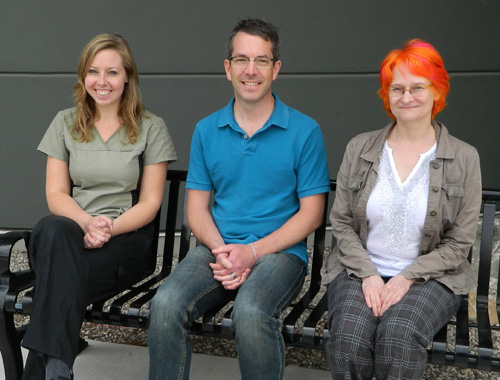
At the end of a long and busy clinic day at Ontario’s Six Nations reserve, veterinary student Adam Little saw a father come in with his children and a young puppy. “I asked him where he got the puppy and how long they’d had it,” says Little. “The father said they’d gotten the puppy 20 minutes ago from a neighbour, and brought him straight to the clinic.”
That experience suggested to Little that the student-run clinic was achieving its goals: “Now that the clinic has been running for several years, this family saw the value of bringing in the puppy for a check-up right away. The people in the community really appreciate what we do in these clinics.”
For the past two years, Little has been actively involved in the Community Outreach Club, a club at the Ontario Veterinary College (OVC) that helps students organize hands-on outreach events for people and pets in communities where access to veterinary information and education is not available. Students Anik Bay, Nicole Stone and Kathryn Nenneker are current co-presidents. Prof. Shane Bateman is one of the faculty advisors: “A good number of years ago, this club started with a project to help homeless pet owners. Over the years, though, the scope has changed and expanded.”
Close to 100 students are on the club’s mailing list and about 30 are actively involved with various projects. “We try to have all the logistics figured out for each event so it is easy for people to participate,” says Bay.
Little says the club has benefitted in recent years from a committed group of senior students, including Samantha Salter and 2010 grads Emma Gardner and Adriana Pastor. Their mentorship has been critical in helping us reach our current successes and pushing our goals forward, says Little.
In the past year, the students have focused on three communities: Guelph’s Westwood Public School, the Bethlehem-United Fred Victor Centre in Toronto, and the Kettle and Stony Point First Nation Reserve near Sarnia, Ont. The latter project was launched after several years of holding successful veterinary clinics for the Six Nations of the Grand River.
Each project area is headed up by one of the group’s co-presidents. Nenneker, for example, has helped other veterinary students provide information to the young pupils of Westwood Public School during their after-school program. The children learn about animal-related topics such as safety around dogs, pet nutrition, what vets do, and “pocket pets.” Response from the kids and teachers has encouraged the OVC club to expand its program into other schools.
Bay leads a group of veterinary students working at the Fred Victor Centre, the only homeless shelter in Toronto that also accepts pets. “We provide education on topics such as nutrition, parasite control and spay and neuter; we also work to connect people with veterinarians in the local community who can help them,” says Bay, who has a personal interest in helping vulnerable populations. “These are people who care a lot about their animals, but because of the barriers they face, they may see that giving the pet to the humane society is the only way to get treatment for the dog or cat.”
Recently, she saw two animals that needed veterinary care: one cat appeared to have mammary cancer, the second seemed to have a urinary blockage. After many phone calls, the Guelph students found veterinarians to treat both. The cat with cancer ultimately needed to be euthanized, but at least the owner was able to say good-bye to a beloved pet and not surrender it to the humane society, says Bay.

Stone, Little and other student volunteers were involved in a veterinary wellness clinic held in May at the Six Nations reserve near Caledonia. “We had about 30 students volunteering for a full day, and we saw about 450 animals,” says Bateman. Services included a physical exam and consultation with a veterinarian, rabies vaccination, other vaccinations and a screening for heartworm disease, all at low cost.
The Six Nations reserve, adds Bateman, is the centre of a heartworm epidemic. “About 150 dogs were diagnosed with the disease at one local clinic last year.” This year, significantly fewer dogs tested positive for heartworm during the OVC wellness clinic, possibly a sign of the clinic’s success. All affected dogs were offered treatment for the parasite.
Dogs and cats at the clinic are also microchipped to assist in identifying them if they are lost, and any minor medical issues are addressed. “It’s very eye-opening,” says Stone. “People were very grateful for the service and appreciated the time the veterinarians took to answer their questions and examine their animals. I also learned a lot about the relationships people have with their pets and how important they are to them.”
The OVC student club is hoping to organize a similar clinic at the Kettle and Stony Point reserve next spring.
“As students, we want to practice and perfect our skills, and here are people who need our skills but are facing various barriers. Both parties can benefit. I’d love to see OVC become involved on a larger scale so that more students have a chance to make a meaningful impact while still at school,” says Little.
Bateman credits Little and two other club members, Danielle Boes and Lucy Fernandes, with making connections and developing these successful projects. “Now we are heading into another year of activities and building on their work,” adds Bateman. “I think these experiences inspire students to make a difference in the world.”